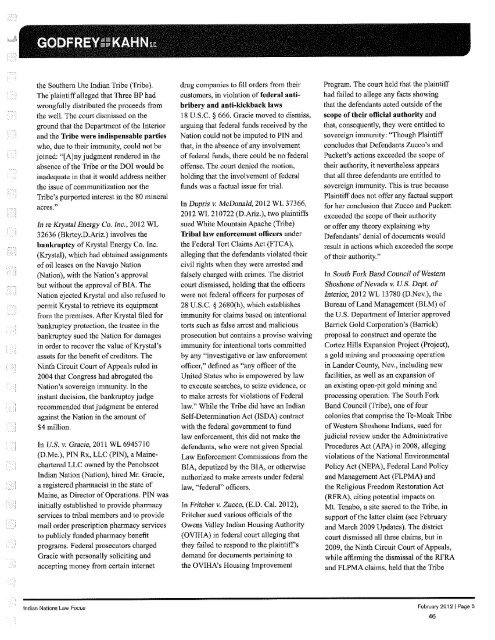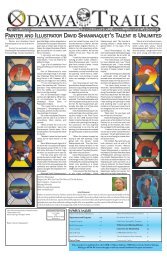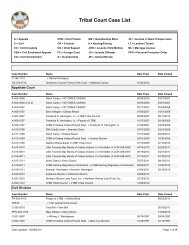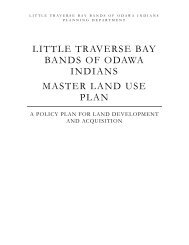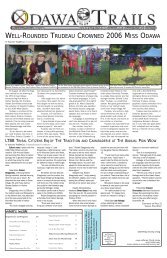United Tribes ) Michigan - Little Traverse Bay Bands of Odawa Indians
United Tribes ) Michigan - Little Traverse Bay Bands of Odawa Indians
United Tribes ) Michigan - Little Traverse Bay Bands of Odawa Indians
You also want an ePaper? Increase the reach of your titles
YUMPU automatically turns print PDFs into web optimized ePapers that Google loves.
the Southern Ute Indian Tribe (Tribe).<br />
The plaintiff alleged that Three BP had<br />
wrongfully distributed the proceeds from<br />
the well. The court dismissed on the<br />
ground that the Department <strong>of</strong> the Interior<br />
and the Tribe were indispensable parties<br />
who, due to their immunity, could not be<br />
joined: "[A]ny judgment rendered in the<br />
absence <strong>of</strong> the Tribe or the DOI would be<br />
inadequate in that it would address neither<br />
the issue <strong>of</strong> communitization nor the<br />
Tribe's purported interest in the 80 mineral<br />
acres."<br />
In re Krystal Energy Co. Inc., 2012 WL<br />
32636 (Bkrtcy.D.Ariz.) involves the<br />
bankruptcy <strong>of</strong> Krystal Energy Co. Inc.<br />
(Krystal), which had obtained assignments<br />
<strong>of</strong> oil leases on the Navajo Nation<br />
(Nation), with the Nation's approval<br />
but without the approval <strong>of</strong> BIA. The<br />
Nation ejected Krystal and also refused to<br />
permit Krystal to retrieve its equipment<br />
from the premises. Amer Krystal filed for<br />
bankruptcy protection, the trustee in the<br />
bankruptcy sued the Nation for damages<br />
in order to recover the value <strong>of</strong> Krystal's<br />
assets for the benefit <strong>of</strong> creditors. The<br />
Ninth Circuit Court <strong>of</strong> Appeals ruled in<br />
2004 that Congress had abrogated the<br />
Nation's sovereign immunity. In the<br />
instant decision, the bankruptcy judge<br />
recommended that judgment be entered<br />
against the Nation in the amount <strong>of</strong><br />
$4 million.<br />
In U.S. v. Gracie, 2011 WL 6945710<br />
(D.Me.), PIN Rx, LLC (PIN), a Mainechartered<br />
LLC owned by the Penobscot<br />
Indian Nation (Nation), hired Mr. Gracie,<br />
a registered pharmacist in the state <strong>of</strong><br />
Maine, as Director <strong>of</strong> Operations. PIN was<br />
initially established to provide pharmacy<br />
services to tribal members and to provide<br />
mail order prescription pharmacy services<br />
to publicly funded pharmacy benefit<br />
programs. Federal prosecutors charged<br />
Gracie with personally soliciting and<br />
accepting money from certain interne<br />
drug companies to fill orders from their<br />
customers, in violation <strong>of</strong> federal antibribery<br />
and anti-kickback laws<br />
18 U.S.C. § 666. Gracie moved to dismiss,<br />
arguing that federal funds received by the<br />
Nation could not be imputed to PIN and<br />
that, in the absence <strong>of</strong> any involvement<br />
<strong>of</strong> federal funds, there could be no federal<br />
<strong>of</strong>fense. The court denied the motion,<br />
holding that the involvement <strong>of</strong> federal<br />
funds was a factual issue for trial.<br />
In Dupris v. McDonald, 2012 WL 37366,<br />
2012 WL 210722 (D.Ariz.), two plaintiffs<br />
sued White Mountain Apache (Tribe)<br />
Tribal law enforcement <strong>of</strong>ficers under<br />
the Federal Tort Claims Act (FTCA),<br />
alleging that the defendants violated their<br />
civil rights when they were arrested and<br />
falsely charged with crimes. The district<br />
court dismissed, holding that the <strong>of</strong>ficers<br />
were not federal <strong>of</strong>ficers for purposes <strong>of</strong><br />
28 U.S.C. § 2680(h), which establishes<br />
immunity for claims based on intentional<br />
torts such as false arrest and malicious<br />
prosecution but contains a proviso waiving<br />
immunity for intentional torts committed<br />
by any "investigative or law enforcement<br />
<strong>of</strong>ficer," defined as "any <strong>of</strong>ficer <strong>of</strong> the<br />
<strong>United</strong> States who is empowered by law<br />
to execute searches, to seize evidence, or<br />
to make arrests for violations <strong>of</strong> Federal<br />
law." While the Tribe did have an Indian<br />
Self-Determination Act (ISDA) contract<br />
with the federal government to fund<br />
law enforcement, this did not make the<br />
defendants, who were not given Special<br />
Law Enforcement Commissions from the<br />
BIA, deputized by the BIA, or otherwise<br />
authorized to make arrests under federal<br />
law, "federal" <strong>of</strong>ficers.<br />
In Fritcher v. Zucco, (E.D. Cal. 2012),<br />
Fritcher sued various <strong>of</strong>ficials <strong>of</strong> the<br />
Owens Valley Indian Housing Authority<br />
(OVIHA) in federal court alleging that<br />
they failed to respond to the plaintiff's<br />
demand for documents pertaining to<br />
the OVIHA's Housing Improvement<br />
Program. The court held that the plaintiff<br />
had failed to allege any facts showing<br />
that the defendants acted outside <strong>of</strong> the<br />
scope <strong>of</strong> their <strong>of</strong>ficial authority and<br />
that, consequently, they were entitled to<br />
sovereign immunity: "Though Plaintiff<br />
concludes that Defendants Zucco's and<br />
Puckett's actions exceeded the scope <strong>of</strong><br />
their authority, it nevertheless appears<br />
that all three defendants are entitled to<br />
sovereign immunity. This is true because<br />
Plaintiff does not <strong>of</strong>fer any factual support<br />
for her conclusion that Zucco and Puckett<br />
exceeded the scope <strong>of</strong> their authority<br />
or <strong>of</strong>fer any theory explaining why<br />
Defendants' denial <strong>of</strong> documents would<br />
result in actions which exceeded the scope<br />
<strong>of</strong> their authority."<br />
In South Fork Band Council <strong>of</strong> Western<br />
Shoshone <strong>of</strong> Nevada v. U.S. Dept. <strong>of</strong><br />
Interior, 2012 WL 13780 (D.Nev.), the<br />
Bureau <strong>of</strong> Land Management (BLM) <strong>of</strong><br />
the U.S. Department <strong>of</strong> Interior approved<br />
Barrick Gold Corporation's (Barrick)<br />
proposal to construct and operate the<br />
Cortez Hills Expansion Project (Project),<br />
a gold mining and processing operation<br />
in Lander County, Nev., including new<br />
facilities, as well as an expansion <strong>of</strong><br />
an existing open-pit gold mining and<br />
processing operation. The South Fork<br />
Band Council (Tribe), one <strong>of</strong> four<br />
colonies that comprise the Te-Moak Tribe<br />
<strong>of</strong> Western Shoshone <strong>Indians</strong>, sued for<br />
judicial review under the Administrative<br />
Procedures Act (APA) in 2008, alleging<br />
violations <strong>of</strong> the National Environmental<br />
Policy Act (NEPA), Federal Land Policy<br />
and Management Act (FLPMA) and<br />
the Religious Freedom Restoration Act<br />
(RFRA), citing potential impacts on<br />
Mt. Tenabo, a site sacred to the Tribe, in<br />
support <strong>of</strong> the latter claim (see February<br />
and March 2009 Updates). The district<br />
court dismissed all three claims, but in<br />
2009, the Ninth Circuit Court <strong>of</strong> Appeals,<br />
while affirming the dismissal <strong>of</strong> the RFRA<br />
and FLPMA claims, held that the Tribe<br />
Indian Nations Law Focus February 2012 I Page 5<br />
46


